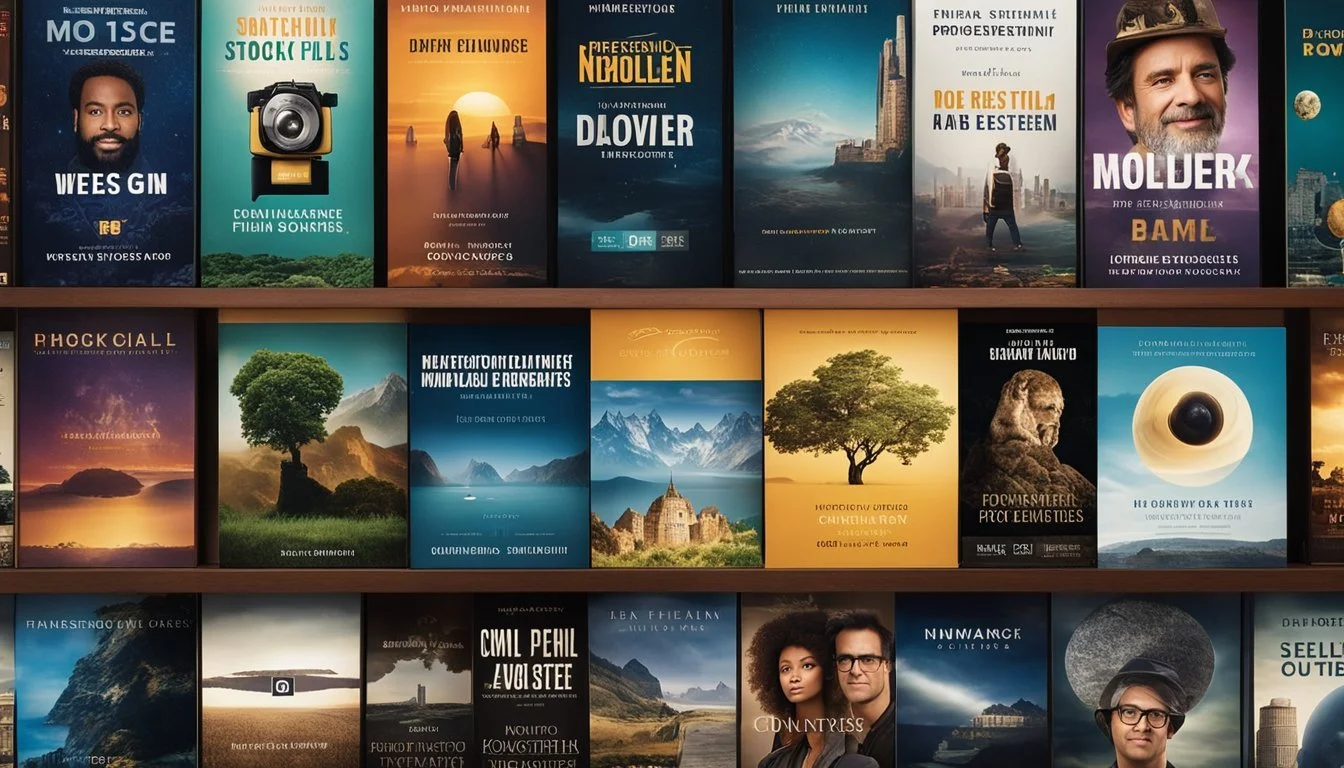6 Documentaries That Discuss the Science of Self-Esteem
Exploring Inner Confidence and Growth
Exploring the interplay between self-esteem and psychological well-being has long been a subject of interest for researchers and filmmakers alike. Documentaries dedicated to this topic provide a fascinating lens through which viewers can better understand the complexities and science behind self-esteem.
These films offer not just an engaging watch, but also valuable insights into how self-esteem influences behavior and personal growth. Each documentary delves into different aspects of self-esteem, inviting viewers to explore how psychological theories manifest in real life. These visual narratives serve as both educational tools and sources of inspiration, highlighting the challenges and possibilities inherent in understanding self-worth.
1) The Mask You Live In (2015)
"The Mask You Live In" examines the narrow definition of masculinity in American culture and its effects on boys and young men. The documentary highlights how societal pressures encourage males to conform to traditional masculine norms that can be damaging to their self-esteem and mental well-being.
Experts, including psychologists and activists, provide insights into the societal structures that reinforce these harmful expectations. They discuss how these norms can lead to emotional disconnection, aggression, and difficulty in forming healthy relationships.
The film features personal stories from individuals who have experienced these pressures firsthand, adding a personal touch to the academic and social discussions presented. These narratives emphasize the challenges of embracing one’s true self in a society that often demands conformity.
"The Mask You Live In" offers solutions aimed at breaking down these stereotypes. It stresses the importance of redefining masculinity to foster healthier self-esteem and emotional expression in boys and men.
For more information, readers can explore the documentary's Wikipedia page or its IMDB page.
2) Happy (2011)
"Happy," a documentary directed by Roko Belic, investigates the complex factors contributing to human happiness. This film takes the audience on a journey through different cultures around the world, examining diverse lifestyles and how they impact people's sense of well-being.
The documentary highlights personal stories and scientific insights. It explores the relationship between happiness and elements such as community, personal growth, and social connections. The film also contrasts material wealth with emotional fulfillment, emphasizing that happiness often stems from non-material sources.
Insights from psychologists and experts provide a deeper look into what contributes to happiness. The documentary presents the idea that self-esteem and positive emotions play crucial roles in achieving lasting happiness.
For more detailed information, visit Wikipedia or IMDb.
3) The Confidence Game: Why We Fall for It... Every Time (2016)
"The Confidence Game: Why We Fall for It... Every Time" delves into the psychology behind why individuals are susceptible to deception, exploring the skillful art of manipulation as portrayed by con artists. This documentary is based on Maria Konnikova's book which unravels the enigmatic allure of charismatic swindlers.
Through empirical research and real-world examples, it highlights how con artists exploit human weaknesses such as trust and belief. This exploration illuminates the mindsets of both the con artist and the unsuspecting victim, offering a thought-provoking examination of human psychology and vulnerability.
The film provides a gripping account of notorious con artists, revealing the intricate techniques employed to deceive people. By understanding these dynamics, viewers can gain insight into their own psychological susceptibilities and learn how to protect themselves from similar manipulations.
For more information, visit IMDB.
4) Miss Representation (2011)
Miss Representation, directed by Jennifer Siebel Newsom, explores the portrayal of women in media and its impact on self-esteem and empowerment. Released in 2011, the documentary examines how limited and often negative depictions affect women's roles in leadership and decision-making positions.
The film uses interviews with women from various fields, including politics and entertainment, to highlight these issues. Through these conversations, it showcases how media representations can contribute to the internalization of gender stereotypes and subsequently affect self-worth and confidence.
Miss Representation also addresses the societal expectations placed on women through media narratives. These expectations often set unrealistic standards, which can hinder personal growth and professional advancement.
By focusing on these themes, the documentary serves as an eye-opener for audiences to recognize and challenge the status quo regarding gender representation in media.
For more information about the film, visit its Wikipedia page.
5) The True Cost (2015)
"The True Cost" is an eye-opening documentary that challenges viewers to reconsider the real price of their clothing. It takes a critical look at the fashion industry and explores its environmental and socio-economic impacts. By pulling back the curtain on how clothes are produced, it draws attention to issues of sustainability and ethics.
The film delves into the lives of garment workers living in developing countries, highlighting the stark contrast between the fashion industry's wealth and the dire conditions these workers face. It sheds light on how fast fashion contributes to their struggles while also examining its collective impact on the planet.
In addition to interviews with industry insiders, the documentary provides insights from environmentalists and workers’ rights advocates. Their voices help present a comprehensive view of how the pursuit of fashion complicates global ecological systems and social justice.
For more information on "The True Cost," visit IMDb.
6) Embrace
"Embrace" (2016) is a critically acclaimed documentary exploring the global issue of body image and self-esteem. This film, directed by Taryn Brumfitt, follows her personal journey of self-acceptance. After facing body image challenges, she sparks a worldwide movement promoting self-love and body positivity.
The documentary includes interviews with experts and everyday individuals, shedding light on the pervasive impact of societal standards on personal self-worth. Through these candid conversations, "Embrace" reveals the often harsh realities faced by those striving for acceptance in a world obsessed with appearance.
Brumfitt's inspirational narrative encourages audiences to challenge traditional beauty ideals and embrace their unique selves without judgment. Her message resonates with people across different demographics who seek to foster a healthier relationship with their body and mind.
By spotlighting diverse perspectives, the film underscores the importance of embracing individuality and cultivating self-esteem. Those interested in exploring themes of self-worth and resilience will find "Embrace" both informative and thought-provoking.
Watch Embrace for a deeper understanding of these issues.
Understanding Self-Esteem
Self-esteem is a critical element in personal development, influencing perceptions of self-worth and impacting various aspects of life. Its significance is evident in education, mental health, and social interactions.
Definition and Importance
Self-esteem refers to an individual's overall evaluation of their own worth. This intrinsic assessment significantly affects motivation, emotional well-being, and communication. People with healthy self-esteem tend to experience better mental health and relationship outcomes.
Low self-esteem is linked with anxiety, depression, and interpersonal difficulties. It often limits one's ability to pursue opportunities and maintain fulfilling relationships. Building self-esteem can enhance resilience, promoting a more optimistic outlook and stronger coping strategies in the face of challenges.
Theories of Self-Esteem
Numerous theories attempt to explain the complexities of self-esteem. One prominent theory is Maslow's hierarchy of needs, which places self-esteem in the context of fulfilling broader human needs. According to Maslow, self-esteem involves self-respect and the respect of others, contributing to self-actualization.
Another significant theory is Coopersmith's Self-Esteem Inventory, which evaluates self-esteem through dimensions of power, significance, competence, and virtue. Additionally, sociometer theory suggests that self-esteem functions as a gauge of social acceptance. These frameworks provide essential insights into the underpinnings of self-esteem, influencing strategies to nurture it across different life stages.
Scientific Methods in Documentary Filmmaking
Scientific methods in documentary filmmaking help transform factual content into engaging visual narratives. By utilizing techniques like thorough research and strategic interviews, filmmakers convey insights effectively, bringing complex topics to a broader audience.
Research and Data Collection
Documentary filmmaking demands detailed research and data collection, which forms the foundation of the narrative. Filmmakers often start by exploring a wide range of sources, including academic papers, archival materials, and contemporary news articles. They gather quantitative and qualitative data, ensuring accuracy and depth.
Filmmakers frequently adopt scientific methodologies such as surveys and experiments to support their claims. This process involves meticulous documentation to maintain an authentic portrayal of the topic. The goal is to provide viewers with a comprehensive understanding of the subject matter by integrating verified facts and statistics into the storytelling.
Interview Techniques
Interviews are a vital component of scientific documentaries, providing personal insights and expert opinions. Filmmakers select subjects carefully, aiming to represent diverse perspectives. They employ structured and semi-structured interview techniques to gather relevant information while allowing participants to express their views naturally.
The interview process includes preparing thought-provoking questions that encourage detailed explanations. By capturing genuine expressions and reactions, filmmakers create a narrative that resonates with audiences. Skilled editing further refines these interviews to highlight key points, enhance clarity, and maintain viewer engagement. These techniques ensure the documentary remains informative yet accessible to a varied audience.
Impact of Documentaries on Perceptions of Self-Esteem
Documentaries on self-esteem often explore the influence of societal factors on personal confidence. They reveal how social media, peer interactions, and media portrayals impact individual self-worth and perceptions.
Case Studies and Evidence
Many documentaries incorporate real-life case studies to illustrate their points. These films often follow the lives of teenagers and young adults, highlighting the struggles they face with self-esteem.
Evidence from these documentaries typically includes expert interviews, statistics, and psychological studies. For instance, some films present data showing how social media use can lead to anxiety and diminished self-esteem due to constant comparison and the pressure to maintain perfect online personas. Additionally, they often examine correlations between low self-worth and issues like cyberbullying.
Public Reception and Critiques
The reception of these documentaries can vary widely. Some viewers praise them for shedding light on important social issues and offering insights into the mental health challenges faced by many. Others may critique them for focusing too much on negative aspects without offering solutions.
Critiques also point out whether the documentaries effectively balance personal stories with broader social context. Public discussions often emerge around the accuracy and depth of the portrayal of self-esteem issues, influencing perceptions and awareness of the topic in society.







